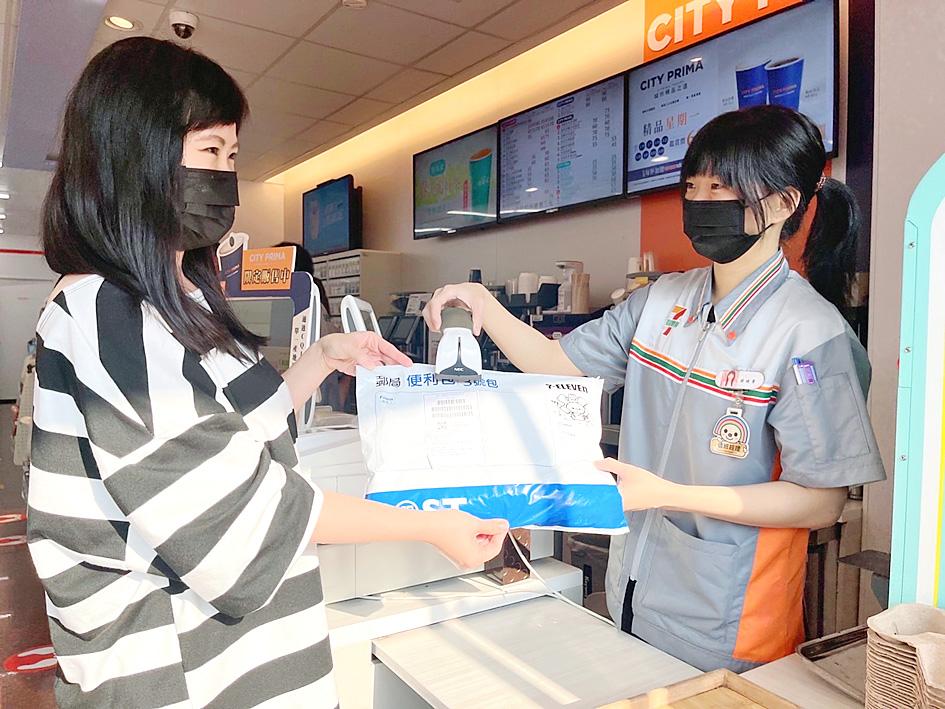Checkout systems at 7-Eleven convenience stores across Taiwan were restored yesterday morning after crashing late on Friday, President Chain Store Corp said.
The company runs the largest convenience store chain in the nation.
Operations of more than 6,000 7-Eleven stores have returned to normal after the company took measures to fix the technical problem, it said.

Photo courtesy of Chunghwa Post via CNA
The checkout systems went down at about 10:40pm on Friday, forcing staff to use calculators to manually calculate orders at the cash register.
Customers were only able to pay with cash, as barcodes on the goods could not be scanned into the sales systems.
Customers were also only given written receipts for their purchases, although they can return to the stores and exchange the manual receipt for a uniform invoice to be eligible for the Ministry of Finance’s cash prize draw.
A 7-Eleven clerk in Taichung on Friday told the Central News Agency that it felt like she had gone back to the era of “grandpa and grandma’s old grocery store.”
“As we all depend heavily on the checkout system and cannot remember the price tag of every item, we had to go to the shelves back and forth to check the prices before adding the prices of the purchases using a calculator,” she said.
Some customers did not have enough cash with them and had to leave stores empty-handed.
The convenience store chain also could not offer other services it normally provides, such as payment of electricity and water bills, as well as deliveries from online shopping.

The Ministry of Economic Affairs has fined Taobao NT$1.2 million (US$36,912) for advertisements that exceed its approved business scope, requiring the Chinese e-commerce platform to make corrections in the first half of this year or its license may be revoked. Lawmakers have called for stricter enforcement of Chinese e-commerce platforms and measures to prevent China from laundering its goods through Taiwan in response to US President Donald Trump’s heavy tariffs on China. The Legislative Yuan’s Finance Committee met today to discuss policies to prevent China from dumping goods in Taiwan, inviting government agencies to report. Democratic Progressive Party Legislator Kuo Kuo-wen (郭國文) said

The Ministry of Economic Affairs has fined Taobao NT$1.2 million (US$36,900) for advertisements that exceeded its approved business scope and ordered the Chinese e-commerce platform to make corrections in the first half of this year or its license would be revoked. Lawmakers have called for stricter supervision of Chinese e-commerce platforms and more stringent measures to prevent China from laundering its goods through Taiwan as US President Donald Trump’s administration cracks down on origin laundering. The legislature’s Finance Committee yesterday met to discuss policies to prevent China from dumping goods in Taiwan, inviting government agencies to report on the matter. Democratic Progressive Party

Taiwan and its Pacific ally Tuvalu on Tuesday signed two accords aimed at facilitating bilateral cooperation on labor affairs, according to Taiwan’s Ministry of Foreign Affairs (MOFA). The governments inked two agreements in Taipei, witnessed by Foreign Minister Lin Chia-lung (林佳龍) and visiting Deputy Tuvaluan Prime Minister Panapasi Nelesone, MOFA said in a news release. According to MOFA, the agreements will facilitate cooperation on labor issues and allow the two sides to mutually recognize seafarers’ certificates and related training. Taiwan would also continue to collaborate with Tuvalu across various fields to promote economic prosperity as well as the well-being of their

Sung Chien-liang (宋建樑), who led efforts to recall Democratic Progressive Party (DPP) Legislator Lee Kun-cheng (李坤城), was released on bail of NT$80,000 today amid outcry over his decision to wear a Nazi armband to questioning the night before. Sung arrived at the New Taipei District Prosecutors’ Office for questioning in a recall petition forgery case last night wearing a red armband bearing a swastika, carrying a copy of Adolf Hitler’s Mein Kampf and giving a Nazi salute. Sung left the building at 1:15am without the armband and covering the book with his coat. Lee said today that this is a serious